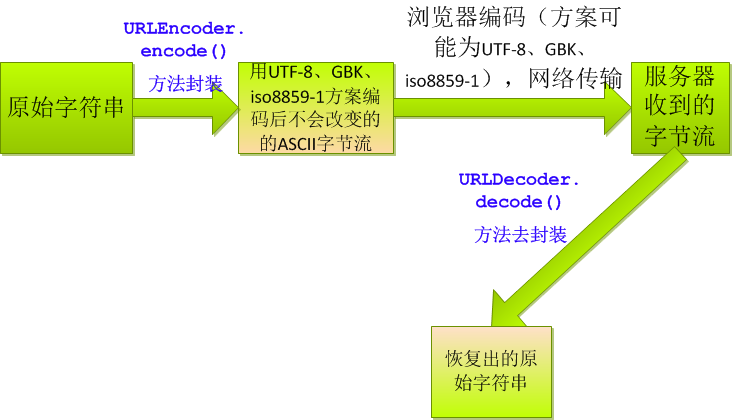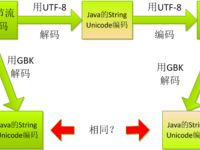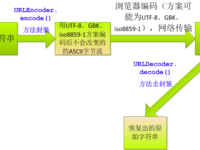近来试着FTP搜索,遇到编码问题,研究了下。
Java内部的String为Unicode编码,每个字符占两个字节。
Java编解码方法如下:
String str = "hi好啊me";
byte[] gbkBytes=str.getBytes("GBK");//将String的Unicode编码转为GBK编码,输出到字节中
String string=new String(gbkBytes,"GBK");//gbkBytes中的字节流以GBK方案解码成Unicode形式的Java字符串
1、表单数据的编码
现在的问题是,在网络中,不知道客户端发过来的字节流的编码方案(发送前浏览器会对数据编码!!!各个浏览器还不一样!!!)
解决方案如下:
 当然URLEncoder.encode(str, "utf-8")和URLDecoder.decode(strReceive,"utf-8")方法中的编码方案要一致。
当然URLEncoder.encode(str, "utf-8")和URLDecoder.decode(strReceive,"utf-8")方法中的编码方案要一致。
2、网址的编码
但以上方法只适合表单数据的提交;对于URL则不行!!!原因是URLEncoder把'/'也编码了,浏览器发送时报错!!!那么,只要http://IP/子目录把http://IP/这部分原封不动(当然这部分不要有中文),之后的数据以'/'分割后分段编码即可
代码如下:
/**
* 对{@link URLEncoder#encode(String, String)}的封装,但不编码'/'字符,对其他字符分段编码
*
* @param str
* 要编码的URL
* @param encoding
* 编码格式
* @return 字符串以字符'/'隔开,对每一段单独编码以encoding编码格式编码
* @version: 2012_01_10
* <p>
* 注意:未考虑':',如直接对http://编解码,会产生错误!!!请在使用前将其分离出来,可以使用
* {@link #encodeURLAfterHost(String, String)}方法解决此问题
* <p>
* 注意:对字符/一起编码,导致URL请求异常!!
*/
public static String encodeURL(String str, String encoding) {
final char splitter = '/';
try {
StringBuilder sb = new StringBuilder(2 * str.length());
int start = 0;
for (int i = 0; i < str.length(); i++) {
if (str.charAt(i) == splitter) {
sb.append(URLEncoder.encode(str.substring(start, i),
encoding));
sb.append(splitter);
start = i + 1;
}
}
if (start < str.length())
sb.append(URLEncoder.encode(str.substring(start), encoding));
return sb.toString();
} catch (UnsupportedEncodingException e) {
e.printStackTrace();
}
return null;
}
/**
* 对IP地址后的URL通过'/'分割后进行分段编码.
* <p>
* 对{@link URLEncoder#encode(String, String)}
* 的封装,但不编码'/'字符,也不编码网站部分(如ftp://a.b.c.d/部分,检测方法为对三个'/'字符的检测,且要求前两个连续),
* 对其他字符分段编码
*
* @param str
* 要编码的URL
* @param encoding
* 编码格式
* @return IP地址后字符串以字符'/'隔开,对每一段单独编码以encoding编码格式编码,其他部分不变
* @version: 2012_01_10
* <p>
* 注意:对字符/一起编码,导致URL请求异常!!
*/
public static String encodeURLAfterHost(String str, String encoding) {
final char splitter = '/';
int index = str.indexOf(splitter);//第一个'/'的位置
index++;//移到下一位置!!
if (index < str.length() && str.charAt(index) == splitter) {//检测第一个'/'之后是否还是'/',如ftp://
index++;//从下一个开始
index = str.indexOf(splitter, index);//第三个'/';如ftp://anonymous:tmp@g.cn:219.223.168.20/中的最后一个'/'
if (index > 0) {
return str.substring(0, index + 1)
+ encodeURL(str.substring(index + 1), encoding);//如ftp://anonymous:tmp@g.cn:219.223.168.20/天空
} else
return str;//如ftp://anonymous:tmp@g.cn:219.223.168.20
}
return encodeURL(str, encoding);
}
/**
* 对IP地址后的URL通过'/'分割后进行分段编码.
* 此方法与{@link #decodeURLAfterHost(String, String)}配对使用
* @param str
* 要解码的URL
* @param encoding
* str的编码格式
* @return IP地址后字符串以字符'/'隔开,对每一段单独解码以encoding编码格式解码,其他部分不变
* @version: 2012_01_10
*
* <p>
* 注意:对字符/一起解码,将导致URL请求异常!!
*/
public static String decodeURLAfterHost(String str, String encoding) {
final char splitter = '/';
int index = str.indexOf(splitter);//第一个'/'的位置
index++;//移到下一位置!!
if (index < str.length() && str.charAt(index) == splitter) {//检测第一个'/'之后是否还是'/',如ftp://
index++;//从下一个开始
index = str.indexOf(splitter, index);//第三个'/';如ftp://anonymous:tmp@g.cn:219.223.168.20/中的最后一个'/'
if (index > 0) {
return str.substring(0, index + 1)
+ decodeURL(str.substring(index + 1), encoding);//如ftp://anonymous:tmp@g.cn:219.223.168.20/天空
} else
return str;//如ftp://anonymous:tmp@g.cn:219.223.168.20
}
return decodeURL(str, encoding);
}
/**
* 此方法与{@link #encodeURL(String, String)}配对使用
* <p>
* 对{@link URLDecoder#decode(String, String)}的封装,但不解码'/'字符,对其他字符分段解码
*
* @param str
* 要解码的URL
* @param encoding
* str的编码格式
* @return 字符串以字符'/'隔开,对每一段单独编码以encoding编码格式解码
* @version: 2012_01_10
*
* <p>
* 注意:对字符/一起编码,导致URL请求异常!!
*/
public static String decodeURL(String str, String encoding) {
final char splitter = '/';
try {
StringBuilder sb = new StringBuilder(str.length());
int start = 0;
for (int i = 0; i < str.length(); i++) {
if (str.charAt(i) == splitter) {
sb.append(URLDecoder.decode(str.substring(start, i),
encoding));
sb.append(splitter);
start = i + 1;
}
}
if (start < str.length())
sb.append(URLDecoder.decode(str.substring(start), encoding));
return sb.toString();
} catch (UnsupportedEncodingException e) {
e.printStackTrace();
}
return null;
}
3、乱码了还能恢复?
问题如下
 貌似图中的utf-8改成iso8859-1是可以的,utf-8在字符串中有中文时不行(但英文部分仍可正确解析)!!!毕竟GBK的字节流对于utf-8可能是无效的,碰到无效的字符怎么解析,是否可逆那可不好说啊。
貌似图中的utf-8改成iso8859-1是可以的,utf-8在字符串中有中文时不行(但英文部分仍可正确解析)!!!毕竟GBK的字节流对于utf-8可能是无效的,碰到无效的字符怎么解析,是否可逆那可不好说啊。
测试代码如下:
package tests;
import java.io.UnsupportedEncodingException;
import java.net.URLEncoder;
/**
* @author LC
* @version: 2012_01_12
*/
public class TestEncoding {
static String utf8 = "utf-8";
static String iso = "iso-8859-1";
static String gbk = "GBK";
public static void main(String[] args) throws UnsupportedEncodingException {
String str = "hi好啊me";
// System.out.println("?的十六进制为:3F");
// System.err
// .println("出现中文时,如果编码方案不支持中文,每个字符都会被替换为?的对应编码!(如在iso-8859-1中)");
System.out.println("原始字符串:\t\t\t\t\t\t" + str);
String utf8_encoded = URLEncoder.encode(str, "utf-8");
System.out.println("用URLEncoder.encode()方法,并用UTF-8编码后:\t\t" + utf8_encoded);
String gbk_encoded = URLEncoder.encode(str, "GBK");
System.out.println("用URLEncoder.encode()方法,并用GBK编码后:\t\t" + gbk_encoded);
testEncoding(str, utf8, gbk);
testEncoding(str, gbk, utf8);
testEncoding(str, gbk, iso);
printBytesInDifferentEncoding(str);
printBytesInDifferentEncoding(utf8_encoded);
printBytesInDifferentEncoding(gbk_encoded);
}
/**
* 测试用错误的编码方案解码后再编码,是否对原始数据有影响
*
* @param str
* 输入字符串,Java的String类型即可
* @param encodingTrue
* 编码方案1,用于模拟原始数据的编码
* @param encondingMidian
* 编码方案2,用于模拟中间的编码方案
* @throws UnsupportedEncodingException
*/
public static void testEncoding(String str, String encodingTrue,
String encondingMidian) throws UnsupportedEncodingException {
System.out.println();
System.out
.printf("%s编码的字节数据->用%s解码并转为Unicode编码的JavaString->用%s解码变为字节流->读入Java(用%s解码)后变为Java的String\n",
encodingTrue, encondingMidian, encondingMidian,
encodingTrue);
System.out.println("原始字符串:\t\t" + str);
byte[] trueEncodingBytes = str.getBytes(encodingTrue);
System.out.println("原始字节流:\t\t" + bytesToHexString(trueEncodingBytes)
+ "\t\t//即用" + encodingTrue + "编码后的字节流");
String encodeUseMedianEncoding = new String(trueEncodingBytes,
encondingMidian);
System.out.println("中间字符串:\t\t" + encodeUseMedianEncoding + "\t\t//即用"
+ encondingMidian + "解码原始字节流后的字符串");
byte[] midianBytes = encodeUseMedianEncoding.getBytes("Unicode");
System.out.println("中间字节流:\t\t" + bytesToHexString(midianBytes)
+ "\t\t//即中间字符串对应的Unicode字节流(和Java内存数据一致)");
byte[] redecodedBytes = encodeUseMedianEncoding
.getBytes(encondingMidian);
System.out.println("解码字节流:\t\t" + bytesToHexString(redecodedBytes)
+ "\t\t//即用" + encodingTrue + "解码中间字符串(流)后的字符串");
String restored = new String(redecodedBytes, encodingTrue);
System.out.println("解码字符串:\t\t" + restored + "\t\t和原始数据相同? "
+ restored.endsWith(str));
}
/**
* 将字符串分别编码为GBK、UTF-8、iso-8859-1的字节流并输出
*
* @param str
* @throws UnsupportedEncodingException
*/
public static void printBytesInDifferentEncoding(String str)
throws UnsupportedEncodingException {
System.out.println("");
System.out.println("原始String:\t\t" + str + "\t\t长度为:" + str.length());
String unicodeBytes = bytesToHexString(str.getBytes("unicode"));
System.out.println("Unicode bytes:\t\t" + unicodeBytes);
String gbkBytes = bytesToHexString(str.getBytes("GBK"));
System.out.println("GBK bytes:\t\t" + gbkBytes);
String utf8Bytes = bytesToHexString(str.getBytes("utf-8"));
System.out.println("UTF-8 bytes:\t\t" + utf8Bytes);
String iso8859Bytes = bytesToHexString(str.getBytes("iso-8859-1"));
System.out.println("iso8859-1 bytes:\t" + iso8859Bytes + "\t\t长度为:"
+ iso8859Bytes.length() / 3);
System.out.println("可见Unicode在之前加了两个字节FE FF,之后则每个字符两字节");
}
/**
* 将该数组转的每个byte转为两位的16进制字符,中间用空格隔开
*
* @param bytes
* 要转换的byte序列
* @return 转换后的字符串
*/
public static final String bytesToHexString(byte[] bytes) {
StringBuilder sb = new StringBuilder(bytes.length * 2);
for (int i = 0; i < bytes.length; i++) {
String hex = Integer.toHexString(bytes[i] & 0xff);// &0xff是byte小于0时会高位补1,要改回0
if (hex.length() == 1)
sb.append('0');
sb.append(hex);
sb.append(" ");
}
return sb.toString().toUpperCase();
}
}

- 大小: 32.8 KB

- 大小: 35.7 KB

